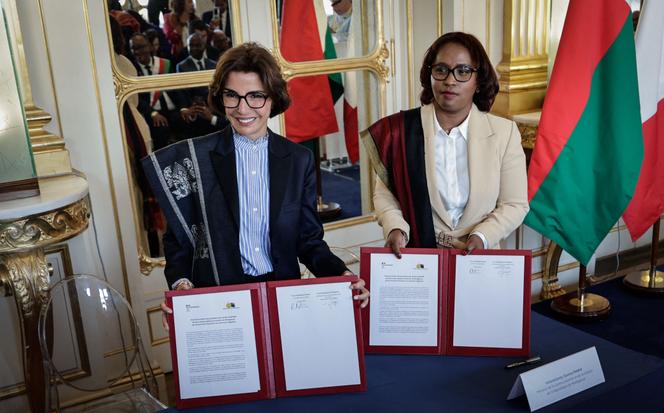


France on Tuesday, August 26, returned three colonial-era skulls to Madagascar, including one believed to be a Malagasy king beheaded by French troops during a 19th-century massacre.
The skull presumed to be that of King Toera and two others from the Sakalava ethnic group were handed over at a ceremony at the French Culture Ministry. French troops beheaded King Toera in 1897, and his skull was taken to France as a trophy, later placed in Paris's national history museum alongside hundreds of other remains from the Indian Ocean island.
"These skulls entered the national collections in circumstances that clearly violated human dignity and in a context of colonial violence," said French Culture Minister Rachida Dati, describing the moment as "historic." Her Madagascar counterpart, Volamiranty Donna Mara, welcomed the return of the skulls as "an immensely significant gesture." "Their absence has been, for more than a century, 128 years, an open wound in the heart of our island," she said.
France has sought to confront its colonial past by returning artefacts and human remains from its museums to their countries of origin. This is the first restitution under a 2023 law facilitating the return of human remains from France's public collections.
A joint scientific committee confirmed the skulls were from the Sakalava people but said it could only "presume" that one belonged to King Toera, Dati said.
Since his election in 2017, President Emmanuel Macron has acknowledged past French abuses in Africa. On an April visit to Antananarivo, Macron spoke of seeking "forgiveness" for France's "bloody and tragic" colonization of Madagascar, which declared independence in 1960 after more than 60 years of colonial rule. The skulls are set to return to the Indian Ocean island on Sunday, where they will be buried.
In recent years, France has sought to reckon with its colonial past, sending back artefacts obtained during its imperial conquests. But the country was hindered by its legislation, which required a special law be passed for each restitution – as in 2002, when South Africa sought the return of "Hottentot Venus," a woman displayed in 19th-century Europe as a human curiosity.
To speed up the process, France's parliament in 2023 adopted a law facilitating the repatriation of human remains. With a third of the 30,000 specimens at Paris's Musée de l'Homme made up of skulls and skeletons, countries including Australia and Argentina have filed their own restitution requests for ancestral remains. France passed a separate law the same year to streamline the return of art looted by Nazis to Jewish owners and heirs.
But a third law enabling the return of property taken during the colonial era has not been finalised. If approved, the legislation would make it easier for the country to return cultural goods obtained through theft, looting, coercion or violence between 1815 and 1972, according to the culture ministry.
A new version of the bill was presented at a government meeting in late July, with Dati saying she hoped it would be adopted "quickly."
